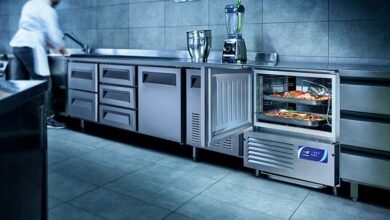The Benefits of Commercial HVAC System Upgrades
Introduction:
Your commercial HVAC system plays a vital role in maintaining indoor comfort, supporting energy efficiency, and ensuring the productivity of everyone inside the building. However, as HVAC systems age, they can become less efficient, more prone to breakdowns, and costlier to maintain. Upgrading your commercial HVAC system isn’t just about replacing old equipment—it’s an investment in your building’s performance, sustainability, and bottom line. In this blog, we’ll explore the key benefits of upgrading your commercial HVAC system and why it may be time to make the switch.
1. Improved Energy Efficiency
Older HVAC systems typically operate at lower efficiency levels, even with routine maintenance. Modern HVAC equipment is built to meet higher energy efficiency standards, featuring:
- Variable-speed motors
- Smart thermostats and zoning systems
- Advanced controls and automation
- ENERGY STAR® certification
Benefit: Reduced energy consumption translates to lower utility bills and a smaller carbon footprint.
2. Lower Operating and Maintenance Costs
As systems age, they often require more frequent repairs, replacement parts, and emergency service calls. Upgrading to new, reliable equipment minimizes the need for constant maintenance and reduces the risk of unexpected breakdowns.
Bonus: Many new systems come with warranties and service packages that further reduce long-term costs.
3. Enhanced Indoor Air Quality (IAQ)
New HVAC systems are designed with improved filtration, humidity control, and ventilation features, which contribute to better indoor air quality. This is especially important in commercial environments like:
- Offices
- Medical facilities
- Schools
- Retail spaces
Impact: Healthier air leads to fewer sick days, higher occupant comfort, and improved employee productivity.
4. Consistent Indoor Comfort
An outdated HVAC system may struggle to evenly heat or cool your building, resulting in hot and cold spots, inconsistent airflow, and occupant complaints. New systems are equipped with zoning controls and advanced sensors that deliver more precise temperature regulation across different areas.
Result: A more comfortable environment for employees, customers, and tenants.
5. Environmental Sustainability
Modern commercial HVAC systems are designed to be eco-friendly. They use newer refrigerants that have a lower environmental impact, consume less energy, and reduce greenhouse gas emissions.
Pro Tip: Upgrading your HVAC system may also help you achieve LEED certification or meet local energy codes and sustainability goals.
6. Integration with Smart Building Technology
Upgraded systems can integrate seamlessly with Building Management Systems (BMS) or smart building platforms. This allows for real-time monitoring, data collection, and predictive maintenance capabilities.
Advantage: Greater control, improved diagnostics, and the ability to make data-driven decisions.
7. Increased Property Value and Marketability
Upgrading your HVAC system can enhance the value of your commercial property. Prospective tenants and buyers are increasingly looking for energy-efficient, well-maintained buildings with smart infrastructure.
Insight: A modern HVAC system can serve as a selling point or a key differentiator in a competitive market.
8. Compliance with Current Regulations
Older HVAC systems may not meet current codes and environmental regulations. Upgrading ensures compliance with:
- Local energy efficiency standards
- ASHRAE guidelines
- EPA refrigerant rules
- OSHA ventilation requirements
Peace of Mind: Avoid penalties or fines while demonstrating a commitment to safety and sustainability.
9. Return on Investment (ROI)
While the upfront cost of an upgrade may seem significant, the long-term ROI is substantial. Lower energy bills, reduced maintenance costs, improved performance, and higher tenant satisfaction all contribute to a faster payback period.
Tip: Many utility companies offer rebates and incentives for upgrading to energy-efficient systems.
When Should You Consider an HVAC Upgrade?
- Your system is more than 10–15 years old
- You experience frequent service calls and rising repair costs
- Occupants complain about inconsistent temperatures or air quality
- Your energy bills are increasing
- You’re planning a building renovation or expansion
- You’re falling behind on compliance or sustainability targets
Conclusion:
Upgrading your commercial HVAC system is a strategic move that brings lasting benefits—enhanced comfort, greater efficiency, cost savings, and improved building performance. If your system is outdated or underperforming, now may be the time to consider an upgrade that supports your goals for years to come.
Need expert advice on upgrading your HVAC system?
Our commercial HVAC specialists can evaluate your current setup and recommend tailored upgrade solutions that deliver maximum performance, efficiency, and value.




